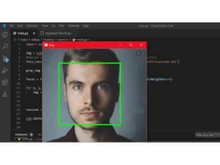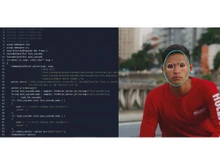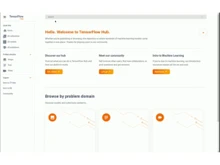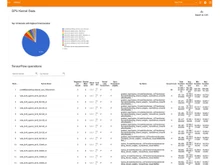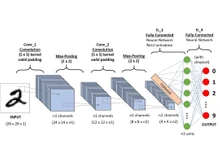OpenCV and TensorFlow are two widely used frameworks in computer vision and machine learning. In this quick comparison, we'll explore the key differences between them in terms of various aspects including performance, flexibility, ease of use, platform support, community backing, scope of applications, documentation, functionality, and popularity. This will help provide a comprehensive understanding of strengths and applications in image processing, deep learning, or other related domains.
OpenCV vs. TensorFlow: An Overview
OpenCV, short for Open-Source Computer Vision Library, is an open-source computer vision and machine learning software library. It provides a wide range of tools for real-time image and video analysis, including advanced algorithms for object detection, recognition, tracking, and image processing. Apart from that, OpenCV is widely used for developing applications in areas such as robotics, augmented reality, autonomous vehicles, and medical image analysis, making it highly important in the field of computer vision.
On the other hand, TensorFlow is an open-source machine learning software developed by Google, designed to facilitate the implementation, training, and deployment of deep learning models. It offers a platform for building and deploying machine learning and deep learning systems, with support for image recognition, natural language processing, and recommender systems. TensorFlow's flexibility, scalability, and extensive library of tools make it a popular choice for researchers, developers, and businesses seeking to leverage the power of artificial intelligence.
OpenCV vs. TensorFlow: Key Differences
Here are some key differences between OpenCV and TensorFlow below:
- TensorFlow and a few TensorFlow alternatives are specialized in deep learning, while OpenCV focuses on traditional computer vision.
- OpenCV and some of the OpenCV alternatives offer image and video processing tools, while TensorFlow provides support for neural network architectures and training.
- TensorFlow is widely adopted in industry and research for machine learning tasks, whereas OpenCV has a strong community in computer vision.
OpenCV and TensorFlow: In Terms of Features
Below are some major differences between TensorFlow and OpenCV based on feature differences. These include documentation, algo-functionality, platform support, and others.
- Hardware/Platform Support: OpenCV provides support for a wide range of platforms including Windows, macOS, Linux, Android, and iOS. However, TensorFlow supports a variety of platforms including desktop, mobile, and edge devices, and it also supports hardware acceleration through GPUs and TPUs.
- Documentation: TensorFlow provides extensive documentation and resources, especially for deep learning with TensorFlow's official website and community-contributed content. OpenCV also offers documentation with detailed explanations, examples, and tutorials for computer vision tasks. However, it is not as comprehensive as TensorFlow’s.
- Algo-Functionality: OpenCV offers a wide range of traditional computer vision algorithms and tools for image and video analysis, including feature detection, object tracking, and camera calibration. On the other hand, TensorFlow specializes in deep learning functionality, providing a range of neural network architectures, optimization algorithms, and tools for training and inference.
- Speed/Performance: OpenCV is known for its high speed and real-time image processing capabilities due to its extensive use of C/C++. On the contrary, TensorFlow provides high performance, especially with the help of GPU support for deep learning tasks.
OpenCV vs. TensorFlow: Use Applications/Scope
TensorFlow is particularly used for deep learning applications including image classification, object detection, natural language processing, and reinforcement learning. In contrast, OpenCV is majorly used for traditional computer vision tasks such as image and video processing, object detection, feature extraction, and more.
OpenCV or TensorFlow: Flexibility
OpenCV is highly flexible, offering a diverse range of computer vision algorithms and tools for image and video analysis. On the other hand, TensorFlow is flexible and is widely used for deep learning tasks, including neural networks, natural language processing, and others.
OpenCV and TensorFlow: Learning Curve
OpenCV has a relatively steep learning curve, especially for those new to computer vision, due to its extensive set of functions and image processing techniques. On the other hand, TensorFlow also has a steeper learning curve for deep learning tasks and neural network implementation, however, provides ease of entry for traditional machine learning tasks.
OpenCV or TensorFlow: Ease of Use
Comparatively, TensorFlow provides a more abstract and user-friendly interface for deep learning tasks, especially with high-level APIs like Keras. In contrast, OpenCV is relatively straightforward for basic image processing tasks but offers more complex functionality that requires a deeper understanding of computer vision concepts.
OpenCV vs. TensorFlow: Popularity
TensorFlow is one of the most popular deep learning frameworks, widely adopted in industry and research for a variety of machine learning tasks. On the other hand, OpenCV is highly popular in the computer vision community and is widely used in academic research, industry, and projects.
OpenCV or TensorFlow: Community Support
OpenCV has a large and active community with extensive forums, documentation, and contributions from developers worldwide. On the contrary, TensorFlow also has a strong and active community with widespread usage in both industry and academia, providing a range of resources and support. However, it is not as strong as OpenCV.
Verdict: OpenCV vs. TensorFlow
In conclusion, OpenCV excels in traditional computer vision applications, offering robust image and video processing tools with strong community backing. On the other hand, TensorFlow specializes in deep learning, providing extensive support for building and training neural networks. Apart from that, it is widely adopted in industry and research for various machine learning tasks. While OpenCV is well-suited for tasks such as object detection and facial recognition, TensorFlow is known for applications like image and speech recognition, natural language processing, and generative modeling. Both frameworks play crucial roles in the fields of computer vision and machine learning, with their own set of strengths catering to different user bases.


 5 Ratings & 0 Reviews
5 Ratings & 0 Reviews


